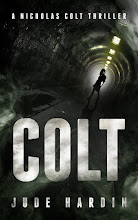"What's Your Book About?"
Ever been asked that question?
Sure you have.
My stock answer (to well-meaning but often naïve laypeople) is usually “murder,” which invariably stops them dead in their tracks. What they’re after, really, is a plot summary.
But plot summaries, to me, are boring. Every plot imaginable has been told thousands of times. Plots are finite, characters infinite. But even a well-drawn, compelling character might fall short in the eyes of an acquisition editor.
So what makes my book different? Why would anyone want to read another story where a PI gets involved in a murder/kidnapping case?
The answer, if you think about it, isn’t what the story is about, but why this character goes to great lengths, risking life and limb, to solve a case (or win someone’s love, or save the world, etc.), when it would be so much easier just to walk away. Why bother?
If you really want to answer the question, you have to start thinking about themes. Not what, but why.
You might not start out with a theme in mind. Even if you don’t, subconsciously there is a current that drives the people in your novel to do what they do. The characters themselves might not be able to vocalize it. The reader might never recognize it. But it’s there. It has to be there, or there is no story. Not one of lasting value, anyway.
Personally, I don’t think about themes at all while I’m writing. But when I go back and read, study, what I’ve written, I can often see that yes, that’s what this was all about!
It’s a magical moment when you discover a theme. Don’t waste it. Go with it, explore and exploit it, rewrite until every scene relates back to it.
If you don’t have any themes in mind when you start, don’t worry. They will emerge. When they do, the smart writer takes advantage of them.
So, dear friends. Tell me. What’s your book about?
Sure you have.
My stock answer (to well-meaning but often naïve laypeople) is usually “murder,” which invariably stops them dead in their tracks. What they’re after, really, is a plot summary.
But plot summaries, to me, are boring. Every plot imaginable has been told thousands of times. Plots are finite, characters infinite. But even a well-drawn, compelling character might fall short in the eyes of an acquisition editor.
So what makes my book different? Why would anyone want to read another story where a PI gets involved in a murder/kidnapping case?
The answer, if you think about it, isn’t what the story is about, but why this character goes to great lengths, risking life and limb, to solve a case (or win someone’s love, or save the world, etc.), when it would be so much easier just to walk away. Why bother?
If you really want to answer the question, you have to start thinking about themes. Not what, but why.
You might not start out with a theme in mind. Even if you don’t, subconsciously there is a current that drives the people in your novel to do what they do. The characters themselves might not be able to vocalize it. The reader might never recognize it. But it’s there. It has to be there, or there is no story. Not one of lasting value, anyway.
Personally, I don’t think about themes at all while I’m writing. But when I go back and read, study, what I’ve written, I can often see that yes, that’s what this was all about!
It’s a magical moment when you discover a theme. Don’t waste it. Go with it, explore and exploit it, rewrite until every scene relates back to it.
If you don’t have any themes in mind when you start, don’t worry. They will emerge. When they do, the smart writer takes advantage of them.
So, dear friends. Tell me. What’s your book about?


3 Comments:
It makes me feel good to know that this might have helped in some way, Lainey. You'll find your themes. They're probably already there. Just takes a little digging sometimes. Good luck!
Hi Jude:
Conspiracy. Unbreakable bonds between siblings. Unbearable mental bondage. I'll have to really think about this now, Jude. VERY thought-provoking!
E
Hi Erica:
It is something to think about.
Subtly woven themes enrich the experience for writer and reader, I believe, even though they often start (and sometimes remain, for the reader at least) at the subconscious level.
Post a Comment
Subscribe to Post Comments [Atom]
<< Home